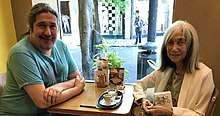María Kodama
María Kodama Schweizer (born March 10, 1937) is the widow of Argentine author Jorge Luis Borges and sole owner of his estate after his death in 1986. Borges had bequeathed to Kodama his rights as author in a will written in 1979, when she was his literary secretary, and bequeathed to her his whole estate in 1985. They were married in 1986, shortly before the death of Borges.[1]

Biography
Kodama is the daughter of a Japanese father and an Argentine mother of Swiss-German, English and Spanish descent.[2] She met Borges when she was a student, at one of his lectures in Buenos Aires on Icelandic literature.
After the death in 1975 of Borges's ninety-nine-year-old mother, with whom he had lived all his life, Kodama became Borges’s literary secretary and had the opportunity—at the invitation of Borges's caretaker, "Fanny"—to assist him as a blind old man in his frequent travels abroad during his later years, when he received many invitations by institutions from around the world. Kodama helped Borges write, as he had lost his sight. She collaborated with him in Breve antología anglosajona (1978) and Atlas (1984, an account of their travels together) and in the translation of the Younger Edda by Snorri Sturluson.
Kodama married Borges through representatives in a civil proceeding in Paraguay on April 26, 1986. This was a common practice for Argentines wishing to circumvent the restrictions on divorce in their country at the time, and Borges was already married once but for many years estranged from his first wife. At the time of the wedding, Borges was terminally ill, and died of cancer in Geneva, Switzerland, on June 14, 1986.
She is president of the Fundación Internacional Jorge Luis Borges, which she founded in Buenos Aires in 1988.
After Borges's death, Kodama renegotiated the English translation rights of his works. In particular, she terminated a longstanding agreement between Borges and the translator Norman Thomas di Giovanni under which royalties for a number of translations on which they collaborated were divided equally between author and translator. New translations by Andrew Hurley were commissioned and published to replace the di Giovanni translations, which were allowed to go out of print.[3]
Kodama's assertive administration of the Borges estate also resulted in a bitter dispute with the French publisher Gallimard regarding the republication of the complete works of Borges in French, with Pierre Assouline in Le Nouvel Observateur (August 2006) calling her "an obstacle to the dissemination of the works of Borges." Kodama took legal action against Assouline, considering the remark unjustified and defamatory, asking for a symbolic compensation of one euro.[4][5][6]
References
- Who is Maria Kodama - The widow, the chosen, the guardian. Archived 2018-04-13 at the Wayback Machine Biographical article on Kodama in the Argentine newspaper Clarin, Oct. 7, 2006 (in Spanish).
- Pérez Bergliaffa, Mercedes (16 June 2017). "Kodama y sus amores: Japón y Borges" (in Spanish). Retrieved 8 February 2020.
- https://www.theguardian.com/books/booksblog/2010/feb/19/jorge-luis-borges-di-giovanni
- "Archived copy". Archived from the original on 2016-03-03. Retrieved 2011-09-14.CS1 maint: archived copy as title (link)
- "Archived copy". Archived from the original on 2016-03-03. Retrieved 2011-09-14.CS1 maint: archived copy as title (link)
- (in Spanish) Octavi Martí, Kodama frente a Borges, El País (Madrid), Edición Impresa, 16 August 2006. Abstract online; full text accessible online by subscription only.
External links
| Wikimedia Commons has media related to María Kodama. |